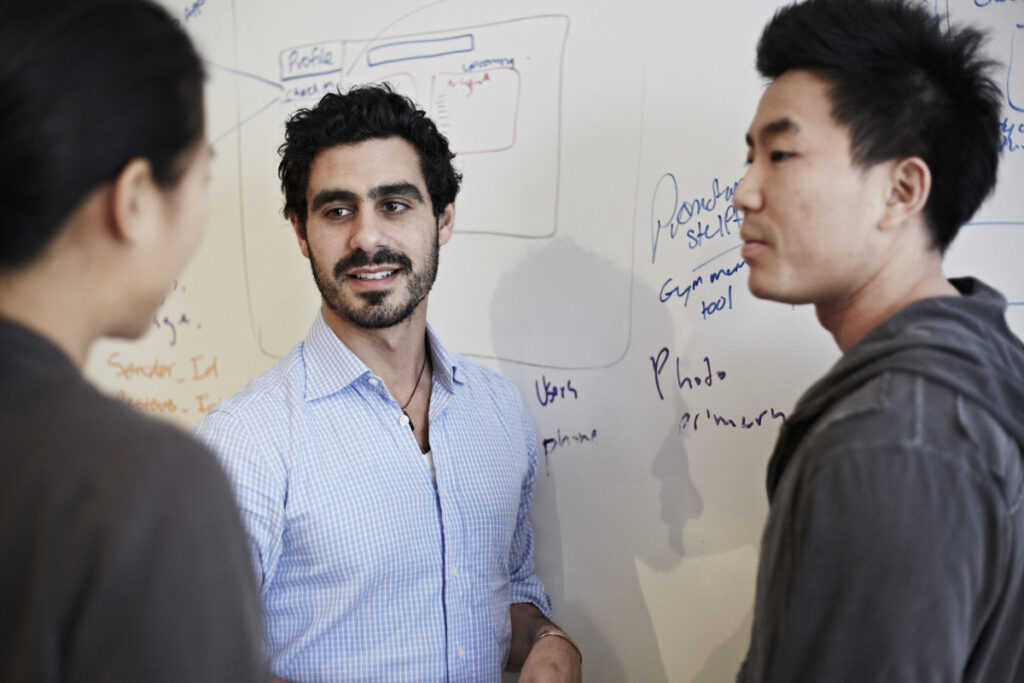If you’re thinking about switching careers and becoming a software engineer, there’s no time like the present. Career transitions take a lot of courage, especially if you are going through it alone or have no clear path or guidance. You might be asking questions like, how and where do I even get started to prepare for a career transition into software engineering?
Well, you’ve made it to the right place to learn how a coding bootcamp is one of the best ways to prepare yourself for a seamless transition to software engineering. In a recent report by Career Karma, GA was ranked #1 for best coding bootcamp.
However, before enrolling in a coding bootcamp, it’s important to understand what joining a coding bootcamp entails, how to prepare for the admissions, and the course itself.
Preparation is key to being successful at anything, especially a career change, so if you find yourself reading this blog post, you’ve come to the right place. General Assembly w has a track record of training 100,000 grads globally and preparing students for the before and after.
Ready to dive in? Let’s start with the admissions process.
Starting your career change with GA
At General Assembly, we know changing your career is a big decision. That’s why we ensure you are supported and have the right resources to make informed decisions from day one. If you’re thinking about joining us for an immersive program, take a look at this overview and what you can expect from the admissions process.
The five stages of the GA admissions process
- If you’ve applied to one of our courses, we will reach out to you via phone and have a quick call to get a sense of your background and goals.
- Next, with the information you’ve given us, we can best guide you in the direction of the course that will allow you to achieve your goals.
- After that, we will ask you to complete a short exercise/assessment to gauge your level of experience.
- From there, you will have a brief interview so we can get to know you and your background more in-depth and decide if you secured your spot.
- If you are chosen, the final step is an onboarding call to discuss steps to enroll and pre-work expectations.
Please note that this process can change based on the student’s needs.
How can you best prepare to secure your place in a GA course
To prepare best to secure your spot at a GA course, our Admissions Producers encourage you to
- Do as much research into the topic of study as possible. Get your hands on the actual technical skills you will be learning during the course. Whether that’s a coding, design or data course, it will help you see if you enjoy it and have an aptitude for it.
Why GA’s admissions process is different
At GA, we like to stick out of the crowd and take a more consultative approach to our admissions process by understanding the needs of every potential student in-depth.
“We like to take a consultative approach. Really learn a student’s background, what they ultimately want to achieve, and what success would look like to them during and post course,” explains Evan Silverman, Sr. Admissions Producer at GA.
Now that you have a better understanding of how the admissions process at GA works let’s take a look at the frequently asked questions you may have before enrolling.
Your coding bootcamp FAQs answered
Q1. How many hours a day is a coding bootcamp?
The number of hours you spend daily at your coding bootcamp will depend on whether you are doing a full-time or part-time bootcamp. A full-time three-month bootcamp will usually include several hours of class time daily.
On the other hand, your part-time bootcamp can run for 24-weeks but with fewer hours per week. The overall amount, however, that you can spend daily will depend on your workload, such as your project work and study time. Some students can spend 8-10 hours from Monday to Friday, which combined is dedicated to attending classes, studying, project work, and research.
Q2. Can you start a coding bootcamp with no experience?
The short answer is yes. You can definitely enroll in a coding bootcamp with no prior coding experience. However, coding is a very niche skill to learn, and it requires dedication, problem-solving, and hard work to become good at coding.
If coding is something you are passionate about, though, and you are considering a career transition to software engineering, chances are you might have already played around with some programming languages and studied some coding resources. The bottom line is that you can achieve anything you set your mind to, regardless if you have prior experience or are new to the subject matter.
“We don’t believe in rejections. We work with students through the admissions process to assess where they are in the learning process; still researching, just starting to look at tutorials, or have spent years self-teaching. Based on that mutual discovery process, the conversation is: How soon will you be ready to start a bootcamp?,” explains Clara Graham de Souza, Admissions Manager at GA.
Q3. Is a coding bootcamp enough to get a job?
Some of the best coding bootcamps can boost your job placement rate within six months of graduation. Additionally, some coding bootcamp graduates have also reported earning a median annual salary of $125,000 within six months of graduation.
Our GA alumni have secured software engineering roles across many different industries like ecommerce, technology, professional services and much more. When our students graduate from one of our bootcamps, they have the possibility of securing a job with some of our premium hiring partners from around the world, like Microsoft, Adobe, IBM, and many more.
Q4. Are coding bootcamps expensive?
Coding bootcamps are definitely an investment. However, they are designed to help you achieve your goals in a much shorter time frame than, let’s say, a 4-year university degree, which would also be more expensive.
Apart from your bootcamp costs, you also need to consider your additional living costs. “Most of us are grown adults with adult responsibilities ranging from rent/mortgage to child care needs or even other caregiver needs. Planning all aspects of your life for this commitment is important because you need time to make the most of a bootcamp as well,” said Clara Graham de Souza, Admissions Manager at GA.
Top 5 tips to prepare for a coding bootcamp
Since most coding bootcamps tend to be run over a short period of time, are intense, and require a high-level of commitment, conducting prior preparation is vital for your success. Here are five tips and tricks to help you nail your coding bootcamp experience.

1. Familiarize yourself with a few programming languages
JavaScript is one of the first programming languages you will learn during a coding bootcamp. This is the most popular programming language in the world, and it’s used by all of your favorite web browsers.
You’ll also learn Ruby. This is a newer but very influential programming language (it was created in 1993) and has been adopted by some big names like Amazon and Github.
The two languages above are often taught together because they’re similar enough that you can pick up both at once—and more importantly, they’re different enough that you’ll be able to see what makes one better than another for certain tasks.
If you want to get your feet wet with these languages before going full speed ahead into learning them both at once, check out some free coding resources to watch tutorials that will teach you everything from basic syntax to more advanced concepts like variables and loops.
2. Don’t shy away from computer science concepts
When you’re just starting out, it’s important to be comfortable with the basics of computer science. This will help you understand exactly what code does and how to program a computer. It’s also good to learn the language of the web (HTML/CSS) so that you can do things like create web pages and build websites using code.
Debugging is a good exercise to help you familiarize yourself with the world of code. The process is when you find bugs in your code by comparing it against other working examples of similar programs or algorithms from books or online resources.
3. Study and prep for your admissions interview
One of the most important parts of preparing for a coding bootcamp is to study for your admissions interview. The interview is a chance to show off your knowledge and skills, so you want to be prepared as much as possible. Here are some tips:
- Read the bootcamp’s website before your interview. You’ll learn more about what they’re looking for in applicants, how they teach their students, and other useful information. It’s also helpful to know what technologies are taught at this bootcamp (for example, do they teach Python 3? Are there any other languages that you should grasp before applying?).
- If possible, ask friends who have gone through admissions interviews at other bootcamps about their experience preparing for these interviews. Did they read blogs? Did they practice mock interviews? Did it help them prepare?
- Connect with alums from this particular coding bootcamp. Ask previous alums about their bootcamp experiences, what did they like best about it? How did it compare with similar programs in different cities or countries around the world?
4. Join coding groups or communities
Learning to code and joining a coding community really goes hand in hand. More often than not, software engineers who come across a problem with their code f will refer to communities for help.
Becoming a skilled coder isn’t necessarily about memorizing how to write lines of code. Instead, it’s about understanding the concepts of each language and knowing which language is most applicable. Here are some of the top communities software engineers and developers use on a daily basis:
- GitHub
- Stack Overflow
- HackerNews
- Hackernoon
- Hashnode
5. Organize your tech set-up and home office
Most coding bootcamps will cater to students working on any machine from Mac, PC, to Linux, but it’s always a good idea to check beforehand. This can be important, especially regarding the software you will be using. Some software might work better on a Mac rather than on a PC or Linux and vice versa.
If you are attending your bootcamp remotely, it’s also important to set up a comfortable and quiet workspace. Coding bootcamps can be intense, and days are busy with lectures, practical work, and assignments. Creating a comfortable environment in which you can peacefully attend classes and study will help you succeed. Your workspace can be any room in the house you find comfortable and know you will be productive from.
Coding bootcamps: a stepping stone in the right direction
A coding bootcamp can be an effective way to gain the skills and experience necessary to secure a software engineering job. Bootcamps are designed to provide intensive, hands-on training in a relatively short period of time, often focusing on practical skills and industry-relevant technologies. They can also give you a taste of the schedule you will be undertaking when you move into a software engineering immersive and can offer things like a flex SEI or full-time SEI.
Whatever you choose, we’re here to help you make your career change dreams come true. Reach out today to learn more about making your coding career a reality.
